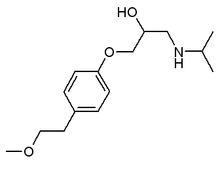The prevalence of chronic heart failure (CHF) is increasing as the proportion of elderly persons in the population increases. Mortality associated with this disorder remains high, and sudden cardiac death is a common cause of death. Fagerberg and collaborators in the international Metoprolol CR/XL Randomised Intervention Trial in Congestive Heart Failure (MERIT-HF) investigated whether the addition of long-acting metoprolol to standard therapy improves survival in patients with CHF.
A total of 3,991 patients were enrolled in the MERIT-HF study. The randomized, placebo-controlled study was conducted at 313 investigational sites in 13 European countries and the United States. Patients in the study were 40 to 80 years of age and had symptomatic heart failure of New York Heart Association (NYHA) functional class II, III or IV for at least three months. All participants had been receiving optimal standard therapy for at least two weeks before the study.
Following a single-blind, two-week placebo run-in period, the patients were randomly assigned to receive placebo (2,001 patients) or metoprolol (1,990 patients). The starting dosage of metoprolol was 12.5 mg once daily in patients who were in NYHA class III or IV and 25 mg once daily in patients with NYHA class II disease. The metoprolol dosage was gradually increased to a target level of 200 mg daily, but the dosage could be modified according to the judgment of the investigator. A daily dosage of 200 mg was attainable in 64 percent of the patients. Patients were assessed every three months. In addition to all-cause mortality as a primary end point, the second primary end point was all-cause mortality in combination with all-cause admission to the hospital.
The metoprolol and placebo groups were similar in demographic and baseline characteristics, and no patients were lost to follow-up. During a mean follow-up period of one year, 145 patients in the metoprolol group and 217 patients in the placebo group died. The mortality rate in the metoprolol group was 7.2 percent per patient-year of follow-up, which was significantly lower than the mortality rate of 11 percent per patient-year of follow-up in the placebo group. There were 128 cardiovascular-related deaths in the metoprolol group, compared with 203 in the placebo group. There were fewer sudden deaths in the metoprolol group than in the placebo group (79 versus 132). Death as a result of worsening heart failure occurred in 30 patients in the metoprolol group, compared with 58 patients in the placebo group.
Analysis of the data in relation to the patient's NYHA classification revealed that the rate of sudden death gradually decreased as the severity of heart failure increased.
The authors conclude that the addition of long-acting metoprolol to optimal standard therapy of CHF reduced the all-cause mortality rate by 34 percent in patients with stable cardiac failure. They calculate that treatment of 27 such patients with metoprolol for one year would prevent one death. The authors speculate that much of the improvement in survival is attributable to protection from ventricular fibrillation, but they stress that much about the pathophysiology of cardiac failure remains unelucidated.
Fagerberg B, et al. Effect of metoprolol CR/XL in chronic heart failure: metoprolol CR/XL Randomised Intervention Trial in Congestive Heart Failure (MERIT-HF). Lancet June 12, 1999;353:2001-7.
COPYRIGHT 1999 American Academy of Family Physicians
COPYRIGHT 2000 Gale Group



